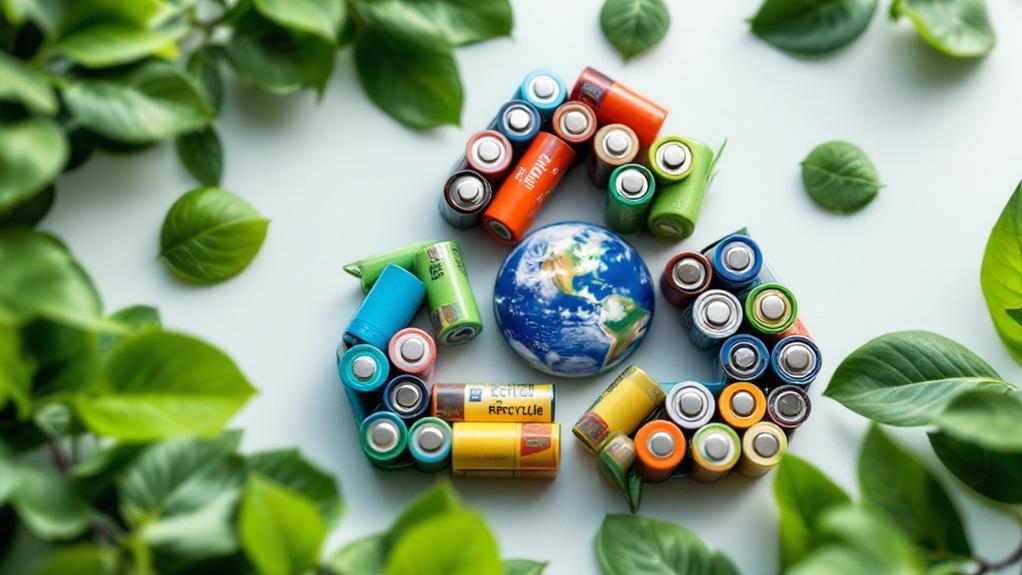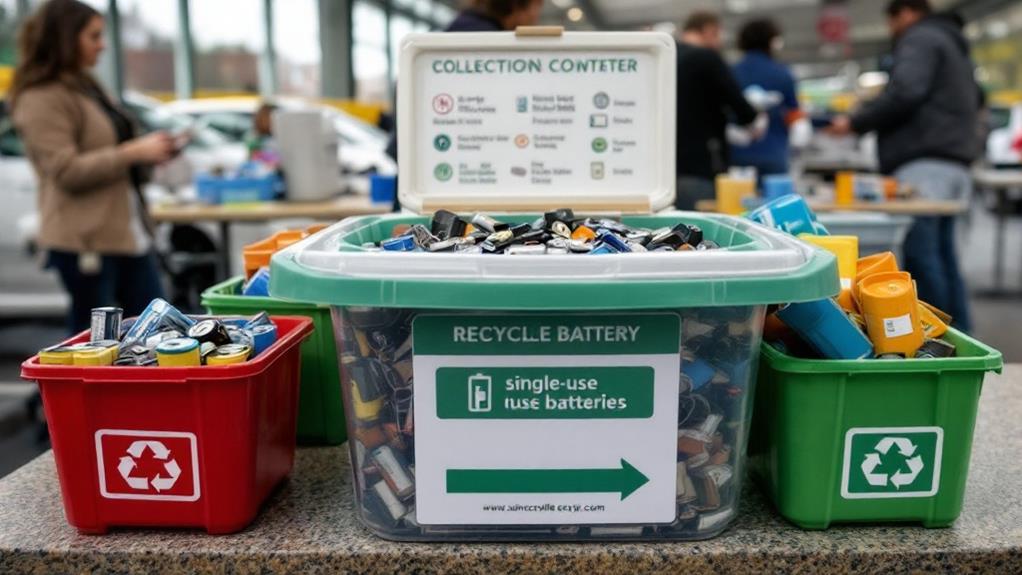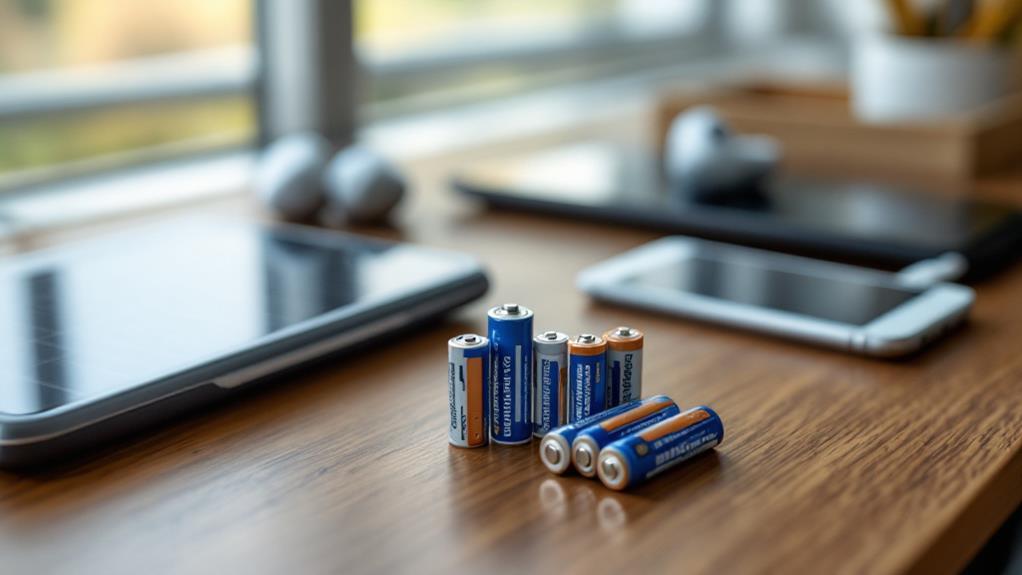Are Single-Use Batteries Recyclable? What You Need to Know

Single-use batteries are recyclable, but proper disposal is indispensable to minimize environmental impact. You can recycle alkaline, zinc-carbon, lithium, and button cell batteries through specialized collection programs. These batteries contain precious materials like zinc, manganese, and steel that can be extracted and reused. However, improper disposal in landfills or through incineration can lead to soil, water, and air pollution. To recycle, locate collection sites at retail stores, community centers, or recycling facilities. Be aware that regulations and recycling processes vary by region and battery type. Understanding the significance of battery recycling is just the first step in reducing your environmental footprint.
Types of Single-Use Batteries
Among the various types of batteries available, single-use batteries come in several common forms. When you're looking at battery classifications, you'll find that disposable batteries are primarily categorized by their size and chemical composition. The most familiar types you'll encounter are alkaline batteries, which are commonly used in household devices. These include AA, AAA, C, D, and 9-volt sizes.
Another type you might come across is zinc-carbon batteries. They're less common now but still used in some low-drain devices. Lithium batteries are another single-use option, known for their long shelf life and high energy density. You'll often find them in cameras, watches, and medical devices.
Button cell batteries are small, round batteries used in watches, hearing aids, and some small electronics. They come in various chemistries, including silver oxide, zinc-air, and lithium. Each of these battery types has unique battery characteristics that make them suitable for specific applications. Understanding these differences can help you choose the right battery for your needs and determine proper disposal methods when they're no longer usable.
Environmental Impact of Battery Disposal
In light of the growing concern for environmental preservation, the disposal of single-use batteries has become an essential issue. When you toss batteries into the trash, you're contributing to several environmental hazards. These batteries often end up in landfills, where they can leak harmful chemicals into the soil and groundwater. Heavy metals like mercury, lead, and cadmium can contaminate ecosystems and pose risks to wildlife and human health.
Improper disposal methods can also lead to air pollution when batteries are incinerated. The toxic fumes released during this process contribute to air quality degradation and climate change. Furthermore, the resources used to produce these batteries are wasted when they're not recycled, leading to increased mining and manufacturing activities that further strain the environment.
To mitigate these impacts, it's imperative to investigate proper disposal methods. Many communities offer battery recycling programs or collection points. By participating in these initiatives, you can help recover precious materials and prevent toxic substances from harming the environment. Additionally, opting for rechargeable batteries or exploring alternative energy sources can tremendously reduce your environmental footprint and the need for single-use battery disposal.
Recycling Process for Single-Use Batteries

The recycling process for single-use batteries involves several key steps to recover precious materials and safely dispose of harmful components. First, you'll need to collect and sort the batteries by type, as different batteries require specific recycling methods. Once sorted, the batteries are typically crushed or shredded to separate their components.
Next, various battery processing methods are employed to extract important materials like zinc, manganese, and steel. These may include chemical treatments, heat processes, or mechanical separation techniques. The reclaimed materials can then be used to manufacture new products, including new batteries.
However, recycling infrastructure challenges persist in many areas. Not all communities have access to battery recycling facilities, making proper disposal difficult for some consumers. Additionally, the cost of recycling single-use batteries can be higher than the value of retrieved materials, which can discourage widespread adoption of recycling programs.
To participate in single-use battery recycling, you can look for local collection points at retailers, community centers, or waste management facilities. Some manufacturers also offer mail-in recycling programs. By recycling your batteries, you're helping to conserve resources and reduce environmental impact.
Legislation and Battery Recycling
Governments worldwide have recognized the importance of proper battery disposal and recycling. In many countries, legislation has been enacted to regulate the collection and recycling of single-use batteries. These government regulations aim to reduce environmental impact and promote resource conservation.
You'll find that laws vary by region, but many require retailers and manufacturers to provide collection points for used batteries. Some countries have implemented Extended Producer Responsibility (EPR) programs, making battery producers responsible for the entire lifecycle of their products, including disposal and recycling.
Consumer awareness plays a pivotal role in the success of battery recycling initiatives. You're encouraged to familiarize yourself with local regulations and participate in recycling programs. Many governments have launched public education campaigns to inform you about the importance of proper battery disposal and available recycling options.
In some areas, you may face fines for improperly disposing of batteries in regular trash. It is necessary to stay informed about your local requirements and take advantage of recycling facilities. By following these regulations, you're contributing to a more sustainable future and helping to minimize the environmental impact of single-use batteries.
Battery Collection Programs

Battery collection programs form the backbone of successful recycling initiatives for single-use batteries. These programs provide convenient ways for consumers to dispose of their used batteries responsibly. You'll find battery collection locations in various places, including retail stores, community centers, and recycling facilities.
Many retailers and manufacturers have partnered with recycling organizations to create efficient battery collection networks. These battery collection partners work together to guarantee that used batteries are properly collected, sorted, and processed for recycling.
To participate in battery collection programs, you can follow these steps:
- Gather your used single-use batteries
- Locate a nearby battery collection point using online resources or local directories
- Safely store and transport your batteries to the collection site
- Drop off your batteries in the designated containers
Challenges in Battery Recycling
Despite the growing awareness of battery recycling's importance, several challenges persist in making the process efficient and widespread. One significant hurdle you'll encounter is material contamination. When different types of batteries are mixed together, it complicates the recycling process and can lead to safety hazards. For instance, lithium batteries can cause fires if not properly separated from other battery types.
Another major challenge is the high recycling costs associated with single-use batteries. The process of breaking down and recovering materials from these batteries is often more expensive than manufacturing new ones. This economic barrier discourages many recycling facilities from accepting single-use batteries, limiting your options for proper disposal.
You'll also face the challenge of low consumer participation. Many people are unaware of the importance of battery recycling or find it inconvenient to locate proper disposal sites. This leads to batteries ending up in landfills, where they can leak harmful chemicals into the environment. To overcome these challenges, you'll need to support initiatives that improve recycling technologies, increase public awareness, and make battery collection more accessible in your community.
Alternatives to Single-Use Batteries

Embracing alternatives to single-use batteries can greatly reduce your environmental impact and save you money in the long run. Rechargeable options are the most popular and widely available alternative. They're more cost-effective over time and considerably reduce waste. Many devices now come with built-in rechargeable batteries, eliminating the need for disposable ones altogether.
Consider these environmentally friendly alternatives to single-use batteries:
- Rechargeable NiMH or lithium-ion batteries
- Solar-powered devices
- Hand-crank powered gadgets
- USB-rechargeable batteries
Battery reuse programs are another excellent option. Some retailers and manufacturers offer programs where you can bring in your used batteries for proper recycling or repurposing. These programs help extend the life of battery materials and reduce the demand for new raw materials.
When shopping for electronics, prioritize devices that use rechargeable batteries or alternative power sources. This shift in consumer behavior can drive manufacturers to produce more sustainable products. By making conscious choices and exploring alternatives, you'll contribute to reducing battery waste and conserving important resources. Remember, every small change in your habits can make a notable difference in the long run.
Proper Battery Storage and Handling
While exploring alternatives to single-use batteries is important, it's equally essential to understand how to properly store and handle any batteries you use. Proper storage ensures longevity and safety, while correct handling prevents accidents and environmental contamination.
Store batteries in a cool, dry place away from direct sunlight and heat sources. Keep them in their original packaging or use a battery organizer to prevent contact between terminals. Don't mix different types or brands of batteries, and remove them from devices when not in use for extended periods.
For safe transportation, secure batteries to prevent short circuits. Use electrical tape to cover terminals or place each battery in a separate plastic bag. Never carry loose batteries in your pocket or purse, as they can come into contact with metal objects and cause fires.
Proper containment is indispensable when disposing of batteries. Use designated battery recycling containers or collection points. Don't throw them in regular trash, as they can leak harmful chemicals. For damaged or swollen batteries, place them in a non-conductive container filled with sand or kitty litter before disposal.
Benefits of Recycling Batteries

Recycling batteries offers numerous benefits that extend far beyond simple waste reduction. When you choose to recycle your used batteries, you're contributing to a more sustainable future and making a positive environmental impact. By keeping batteries out of landfills, you're helping to prevent harmful chemicals from leaching into the soil and water supplies.
One of the most significant advantages of battery recycling is the conservation of precious metals. The materials recovered from recycled batteries can be used to manufacture new products, reducing the need for raw material extraction. This process leads to reduced waste production and helps preserve our planet's finite resources.
- Conserves essential metals like lithium, cobalt, and nickel
- Reduces greenhouse gas emissions associated with mining
- Prevents toxic materials from contaminating the environment
- Creates jobs in the recycling industry
Future of Battery Technology
The future of battery technology holds exciting possibilities that could revolutionize how we store and use energy. As researchers continue to push the boundaries of battery innovation, you'll likely see substantial improvements in capacity, charging speed, and lifespan. Solid-state batteries, for instance, promise greater energy density and safety compared to current lithium-ion batteries.
You can expect advancements in renewable energy storage, with batteries playing an indispensable role in harnessing and distributing power from solar and wind sources. This will help stabilize the grid and make clean energy more reliable. Additionally, you'll see progress in fast-charging technologies, potentially allowing you to charge your electric vehicle in minutes rather than hours.
Biodegradable batteries are another area of focus, addressing environmental concerns associated with battery disposal. These eco-friendly options could markedly reduce the impact of discarded batteries on landfills and ecosystems. As battery technology evolves, you'll benefit from more efficient, sustainable, and versatile energy storage solutions in your daily life, from powering your devices to supporting large-scale energy systems.



